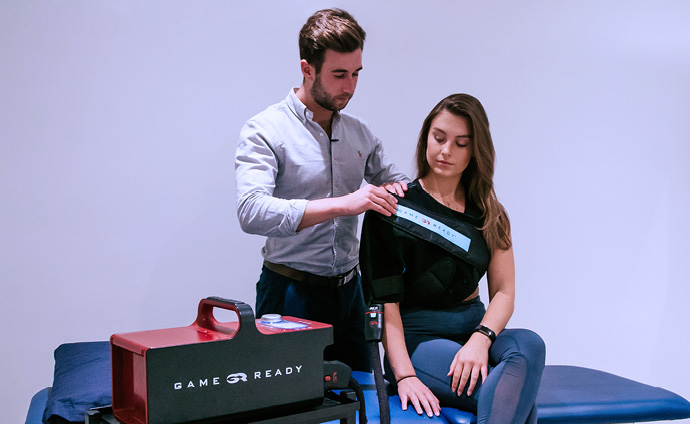Frozen shoulder is one of those conditions that there is a lot of conjecture over in the medical world — everything from causes to effective treatment is hotly debated.
And while in the past there has been a school of thought that suggests physio isn’t the most effective treatment for frozen shoulder, that is an overly simplistic statement that can be debunked in many ways. So, let’s get to the debunking! But first…
What exactly is frozen shoulder?
Put simply, frozen shoulder is when your shoulder has stiffened up to the point that movement is impaired and painful, normally over a period of months or even years.
But there are actually two types of frozen shoulder, known as primary and secondary.
Primary frozen shoulder is what most medical professionals would refer to as a true frozen shoulder and occurs due to the capsular tissue in the shoulder gradually tightening up over time. Secondary frozen shoulder is when the shoulder tissue has been torn or damaged in some way, which then triggers the capsular stiffening up — so while the end result might present largely the same, the journey to have gotten to that point is somewhat different.

How does frozen shoulder happen?
While it’s clear that secondary frozen shoulder is caused by some sort of small trauma or impingement to the area (often so small that you’ll think nothing of it at the time of the injury occurring!), primary frozen shoulder can literally be caused by nothing at all, as it happens so slowly and gradually over a long period.
It’s not uncommon for a physio to see a patient with frozen shoulder who thinks it was caused by nothing (and may have self-diagnosed primary frozen shoulder), only to remember after questioning from their physio, that they fell off their bike six months ago and thought they were fine at the time. An incident, even this innocuous, can often be traced back as the origin of the damage that led to secondary frozen shoulder.
So, can physio help treat frozen shoulder?
As we mentioned at the start it has historically been common for medical professionals, particularly doctors, to dismiss physio as a possible treatment path for frozen shoulder. And when it comes to primary frozen shoulder, this isn’t an entirely inaccurate view.
In some cases where primary frozen shoulder has tightened to an extreme point over a long period of time, the tightening will be so robust that it’s extremely unlikely physio on its own will be enough to fix it. However, what physio can do in this instance is reduce pain and help patients feel more comfortable, as well as treat the deficits and help create the changes needed to help prevent frozen shoulder occuring again.
What do we mean by this?
It is highly likely that primary frozen shoulder will have compounded over time because of deficits in the way someone is moving their shoulder — whether that is performing a certain movement, or relating to their posture. We can help treat these deficits, which normally looks like strengthening an area that is weak or loosening an area that is tight, to help restore and maintain normal mobility and movement in the shoulder area and reduce discomfort. In some cases, these altered movement patterns could actually be the cause of the discomfort rather than it being frozen shoulder at all, so this is also a possibility we will explore.

So what about secondary frozen shoulder?
Secondary frozen shoulder is much more easily treated using physio, as the condition has stemmed from an initial injury or inflammation — even if the patient didn’t realise that they had done damage at the time.
With some patients who are suffering quite severely, we will recommend seeing a doctor to get an injection that can kick-start the initial loosening process of the shoulder first, as there is a lot of research to show that physio can then maximise the gains and get more movement back.
Either way, there are many different therapies that we offer that can help treat frozen shoulder. We will start most patients on GameReady Ice/Compression treatment to reduce inflammation and speed up the healing process and if they are suffering from nerve pain or muscular spasm we will normally also use a TENs machine to help settle that. Of course, all treatments will only be recommended after a thorough assessment, personalised to the specific patient’s situation.
In extreme circumstances, we may recommend a patient explore surgical options, but that is an invasive and painful option, so we will do everything we can to help a patient avoid this path.
So, there you have it! In some instances, physio can certainly treat frozen shoulder and in nearly all instances physio can help reduce pain and discomfort! So don’t you think we’re worth a visit?
Suffering from frozen shoulder and not sure whether physio is the answer? Book a time to come and see us for a personalised assessment and we will let you know whether we can help.



